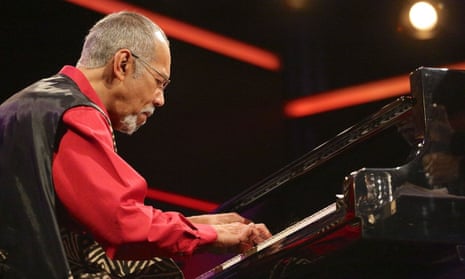A piano technique that could embrace ragtime, boogie, Art Tatum’s dazzling virtuosity, Thelonious Monk’s terseness, post-1960s free-jazz and experimental electronics ought to have been enough to make the American pianist Stanley Cowell a major jazz star – even if he had never extended those talents into adventurous composition, an illustrious teaching career, and a founding role in one of the most successful African-American-run record labels of the 20th century.
Yet Cowell, who has died aged 79, was an innovator who remained under the radar for long periods of his rich musical life. By a mix of single-mindedness, happenstance, a passion for education that rivalled his performing talents, and indifference to others’ opinions of his originality, Cowell walked his own road.
But this was no privately devoted journey, because Cowell always understood the beat of the popular pulse, whether in forms of jazz that caught the rhythms of dancefloors and church-rooted songs as hard-bop did, or in early electric-jazz experiments such as his 1969 album Blues for the Viet Cong, with its title track, an edgily choppy trio piece confronting US involvement in Vietnam.
Teen-prodigy years and a family connection with Tatum mixed with a formal music education to see Cowell mature as a jazz and classical performer. He worked with the multi-reeds phenomenon Rahsaan Roland Kirk while attending Oberlin College in Ohio in 1962, and had subsequent partnerships with the free-jazz saxophonist Marion Brown and the bebop-pioneering drummer Max Roach. From 1969 to 1973 he worked with Music Inc, a big-band collective steered by a Roach protege, the trumpeter Charles Tolliver.
Cowell also co-formed the Strata-East record label with Tolliver in 1971, with the album Music Inc & Big Band its first release. The label was dedicated to exploratory African-American jazz and to original sessions by the founders – notably Cowell’s innovative all-piano septet Piano Choir – but it was also broadminded enough to release the album Winter in America, by Gil Scott-Heron and Brian Jackson, in 1974. Although Cowell and Tolliver decided to withdraw from Strata-East that year, mainly to pursue their busy touring and recording schedules, the label remains active, and is iconic to a new jazz generation.
Thereafter Cowell worked regularly with the Philadelphia hard-bop siblings Jimmy, Percy and Albert Heath in the Heath Brothers group for a decade from 1974, and recorded with Joe Henderson, Art Pepper, Johnny Griffin and Roy Haynes in the 70s. He also toured widely with his own groups and with the trombonist JJ Johnson in the 80s and 90s. In his mid-life years his composing increasingly stretched toward jazz and classical fusions, alongside a burgeoning teaching career at Lehman College in New York (1988-99) and the New England Conservatory (1988-89) until his retirement from Rutgers University in 2013.
Born in Toledo, Ohio, Stanley was the son of Hazel (nee Lytle) and her husband, also Stanley, a businessman who built the city’s first motel and was an amateur violinist. The boy received classical piano lessons from the age of four, and the family home was an open house for jazz artists, including Tatum, another native of Toledo who duetted with the then six-year-old at his father’s invitation in 1947.
Studying piano and pipe organ, Stanley was taken up with classical music until his mid-teens, when jazz began increasingly to fascinate him. He performed Dmitry Kabalevsky’s Piano Concerto No 3 with the Toledo Youth Orchestra at 15 and attended the Mozarteum Academy, Salzburg, in 1960 and the Oberlin Conservatory of Music, Ohio, in 1962, before pursuing graduate studies at the universities of Wichita, Southern California and Michigan.
His periods of work with Brown and Roach followed a master’s degree at Michigan in 1966, sparking a transformational decade in his life in which he met Tolliver and became a linchpin of Tolliver’s Music Inc big band, co-nurtured Strata-East, took off as a composer and improviser, and was a first-call piano partner for some of the the biggest names on the borders of bebop and free-jazz.
He conceived his adventurous all-piano ensemble, Piano Choir, in 1972, and became a founding member of Collective Black Artists Inc, a non-profit operation dedicated to advancing African-American music. In 1974 he worked alongside composing and arranging luminaries such as Gil Evans and Sy Oliver at Carnegie Hall in the New York Jazz Repertory Company.
In parallel with his busy studio and road-life, Cowell also worked extensively with the fusion guitarist Larry Coryell, in Japan with the trio We Three, and on the road with his own groups. He also recorded a succession of fine albums as a leader, including the ingenious trio sets Sienna (1989), Departure No 2 (1990), and Live at Copenhagen Jazz House (1993).
Additionally, he composed some large-scale original works, including his Tatum-dedicated Piano Concerto No 1, which was premiered in 1992 by the Toledo Symphony Orchestra. While academic life took up much of his later years, he continued to perform through reunions with friends, student projects and solo piano improvisations and sporadically with his own bands. In the 2000s he began performing with his daughter Sunny, a violist and singer.
After retirement from Rutgers, Cowell released Juneteenth (2015), a solo piano version of his audacious cross-genre piece for choir, big-band and electronics, and in the same year undertook a week-long season at New York’s Village Vanguard, with a trio that included the saxophonist Bruce Williams.
A jazz master who deserved a wider reputation, he displayed a profound absorption in the African-American jazz past, coupled with a passion about its future in the hands of new generations, and thus left an influential legacy.
He is survived by his wife, Sylvia (nee Potts), Sunny, and another daughter, Sienna, from a previous marriage.
Stanley Allen Cowell, musician, born 5 May 1941; died 17 December 2020

Comments (…)
Sign in or create your Guardian account to join the discussion